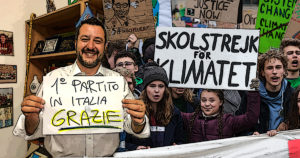Nathan Gardels is the editor-in-chief of Noema Magazine. He is also the co-founder of and a senior adviser to the Berggruen Institute.
The European Parliament elections this week epitomize the politics of our present historical passage, which is torn between “taking back” control and owning the future. While the centrist status quo continued to collapse everywhere, both the Green and populist parties advanced. The former possess a planetary consciousness anchored in the times to come; the latter are rooted in nostalgia for an ideal past of sovereign communities without immigrants, the euro or the cascading consequences of climate change. This sharpening divide between those who think global and those who react local further sucks the political will out of a governing consensus, cementing polarization and paralysis.
These polar opposites could only emerge as political forces in a once-globalizing civilization gone into retreat. The great splintering poses a daunting and unprecedented challenge. Can common ground be found between those looking forward and those left behind; between those, in the famous words of the French “gilets jaunes” protestors, focused on surviving until the end of the month and those worried about the end of the world? Can the partisans of sovereignism effectively address transnational climate issues? Is there any chance of reasonable accommodation between a diverse and inclusive vision of society and the dignity of recognition among one’s own kind conferred by a common sense of belonging?
The fractured nature of the new European Parliament may allow the pro-European liberal groups to coalesce as the main bloc in Brussels and influence the selection of the European Commission leadership. That will only complicate and exacerbate relations with the nativist parties — which now dominate in Britain, Poland and Italy, and which won by a slim margin in France — that are decisive at the national level.
Already poised to leave the European Union, the United Kingdom may see the worst scenario. As the student activist Lara Spirit writes in The WorldPost this week from London:
It might seem peculiar that only 160,000 people will choose Britain’s next prime minister. The population of the country is 66 million. Peculiar and potentially infuriating. But following the resignation of Prime Minister Theresa May last week, it became inevitable that our next leader would be chosen by a ballot of a small “selectorate” of Conservative party members that make up less than half a percent of the population of the country. …
This means whoever Britain’s new leader will be will face the same parliamentary arithmetic as the last. There’s no majority in Parliament for leaving without a deal, nor has one been found for any particular deal.
For Spirit, the paralysis can only be broken through a fresh democratic choice by the public through a second referendum.
Elif Shafak reads some hope into the election results while acknowledging the challenge. “One good thing about the E.U. elections is that it attracted the highest voter turnout in two decades,” she says in an interview. She continues:
It is clear that more and more citizens are becoming passionate about politics: more engaged, more committed. We have to channel this passion into a new narrative that celebrates equality and connectivity — a narrative that appreciates pluralism and liberal democracy.
The challenge is to do this without being perceived as the status quo — to be the vehicle and voice of change for the better, for a true and inclusive democracy.
Speaking as a novelist who strives for the right tone while exploring what makes characters tick, she sees a glaring deficit among those who share her vision. “Populist demagogues are more competent than their liberal counterparts when it comes to addressing people’s emotions,” says Shafak. “Politicians who suppress their emotions don’t have a chance in this climate. This is the moment to unite hearts and minds and bring out emotional intelligence.” She further observes:
I also find it very dangerous when mainstream politicians start to behave just like populists, trying to be even more nationalist than the nationalists, more xenophobic than the xenophobes. The way forward is to be openly and courageously critical of the populist elite but at the same time connect with the people who might have voted for them for different reasons.
Populism is the fake answer to some real problems. The problems are real. The populist elite are anything but.
French President Emmanuel Macron, who himself came to power only two years ago through a campaign against the status quo, has positioned himself as the sober-minded custodian of an open and future-oriented Europe. But the contest for the heart and soul of Europe lay elsewhere.
Given the election results, the two personalities who have widely stirred passions and could be considered emblematic in that contest are the 16-year-old Swedish climate activist Greta Thunberg, though not a politician, and Matteo Salvini, the demagogue who has elevated his League party to the leading party in Italy through exploiting anxiety over the very real issue of immigration. How these three figures and their followers fare will determine the next turn on Europe’s road to the future.



